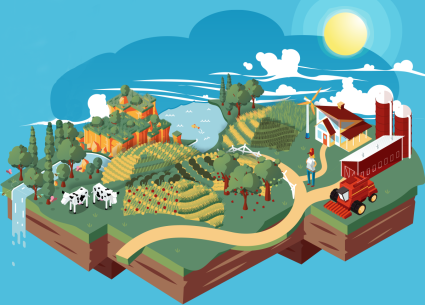awesome infographic on healthy farm practices
from the Union of Concerned Scientists.
Check it out HERE

Congress Should Prioritize Modern, “Healthy Farm” Practices When Farm Bill Debate Re-Starts This Month
Industrial Model of Agriculture Is a Dead End, Scientists Say
WASHINGTON (May 9, 2013) — U.S. agriculture is at a crossroads: continue the polluting, soil-depleting industrialized farming methods of the past, or invest in modern practices of the future. A policy brief and interactive web feature released today by the Union of Concerned Scientists (UCS) shows how several key practices can produce the food we need today while protecting precious natural resources for the long term—benefiting American farmers, consumers and the environment.
“Industrial agriculture sounded good in the 1950s, but it’s not serving us well in the twenty-first century,” said Doug Gurian-Sherman, senior scientist with UCS’s Food and Environment Program and co-author of the policy brief. “To meet the environmental, resource, and production challenges of the future, scientists, policy makers and farmers must work together to invest in a more sustainable kind of agriculture.”
“The Healthy Farm: A Vision for U.S. Agriculture,” identifies and explains four key healthy farm practices that would modernize agriculture to meet today’s challenges:
• Operating farms as part of the natural landscape, preserving uncultivated areas that can harbor beneficial wildlife, actually reduce farmers’ costs and reduce water pollution;
• Growing and rotating a wider variety of crops, which can increase yields while reducing the need for chemical pesticides and synthetic fertilizers;
• Reintegrating livestock and crops, reducing the problem of manure waste and enhancing soil fertility; and
• Growing cover crops to prevent erosion, reduce weeds, capture and hold nutrients in the soil, and protect farmers against drought.
“The benefits of healthy farms make them a no-brainer,” said Margaret Mellon, senior scientist with UCS’s Food and Environment Program and co-author. “Backed by science, these practices are productive and profitable, and ultimately benefit farmers, consumers, rural economies, and the environment. It’s a win-win.”
Of particular interest as farmers in much of the country face a predicted second year of extraordinary drought, several healthy farm practices can actually protect crops against extreme weather. For example, when planted between growing seasons over a period of years, cover crops improve the soil’s water-holding capacity, reducing the need for irrigation and making cash crops less vulnerable to drought.
The policy brief comes as Rep. Earl Blumenauer (D-OR) introduces the Balancing Food, Farm, and Environment Act, legislation to consolidate and fund conservation programs in the Farm Bill. And with debate on the Farm Bill expected this month, UCS is calling on the House and Senate agriculture committees to prioritize research and incentives to support healthy farm practices.
“Some farmers are already adopting healthy farming practices, but with the right support, research, and incentives, many more could make the switch,” said Gurian-Sherman. “Congress should support healthy farming as an investment in the future.”
View UCS’s interactive web feature to bring the healthy farm vision to life.

